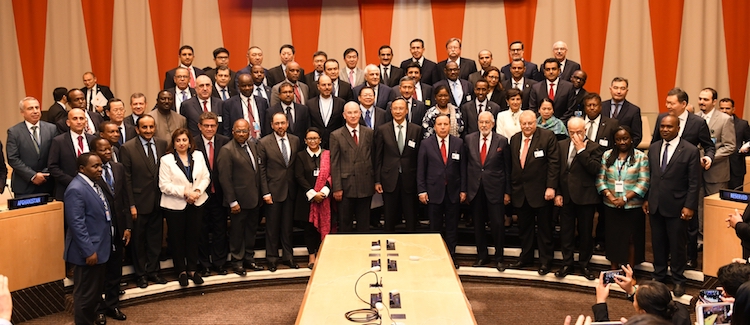By J Nastranis
NEW YORK (IDN) – In the first voluntary political declaration of its kind adopted at the global level, UN Member States have reiterated in the Code of Conduct for the Achievement of a World Free of Terrorism their commitments to strengthen international cooperation to reach the common goal of eradicating a crucial threat to national, regional and international security.
The Code of Conduct, proposed by President Nursultan Nazarbayev of Kazakhstan at the jubilee 70th Session of the United Nations General Assembly in September 2015, proclaims the advent at the global level of a broad coalition of countries united in the shared goal of achieving a world free of terrorism.
Minister of Foreign Affairs of Kazakhstan, Kairat Abdrakhmanov, presented the document to UN Member States at a High-Level Special Event on the margins of the general debate of the ongoing 73rd Session of the General Assembly. It has subsequently been signed by foreign ministers and other senior officials from about 70 countries, according to a press release by the Kazakh Permanent Mission to the UN in New York.
The Code of Conduct builds on the consensus reached through 19 international legal instruments to prevent and combat terrorist acts, as well as the UN Global Counter-Terrorism Strategy, in order to enunciate in 10 clearly drafted pledges all steps necessary to reach a world free of terrorism. “The added value of the Code is to chart the path towards an agreed timeline by the UN Centenary in 2045 for reaching a terrorism-free future, recalling that a goal is a dream with a deadline,” the Kazakh press release notes.
“Kazakhstan expresses hope for increasing the number of countries joining the document in the foreseeable future, as well as ensuring that adhering States abide by its premises to make sure that the Code of Conduct is not only adopted, but also fully implemented,” the press release states.
Speakers at the High-Level Special Event said the Code of Conduct has received wide ranging support because it concedes the inter-linkages between security, counterterrorism and development. As such, it was lauded “as an indispensable pledge” not only to eradicate terrorism, but also advance the UN Sustainable Development Goals adopted by world leaders in September 2015.
The High-Level Special Event comprised briefings by Under-Secretary-General Vladimir Voronkov, Head of the UN Office of Counter-Terrorism (OCT); the African Union Commissioner for Peace and Security, Ambassador Smail Chergui; Ambassador Gustavo Meza-Cuadra, Chair of the UN Security Council Counter-Terrorism Committee; as well as Ambassador Abdallah Al-Mouallimi, Head of the UN Counter-Terrorism Center (UNCCT) and the Group on Counterterrorism of the Organization of Islamic Conference (OIC).
Opening the meeting, Kazakh Foreign Minister Abdrakhmanov highlighted the main thrusts of the document as well as the importance of its goals today, recalling that the contribution of Kazakhstan to the fight against international terrorism represents a priority policy for the country.
Speakers noted the convergence of the goals of Kazakhstan, the United Nations and regional entities, and thanked Astana for initiating the preparation and launch of the Code of Conduct to strengthen international cooperation.
The Code of Conduct contains 10 simple and understandable pledges in the field of counterterrorism. The major commitments are as follows:
1. To give impetus to the practical implementation of a wide-range international obligations on counter-terrorism;
2. To ensure inadmissibility of supporting directly or indirectly terrorist groups in order to achieve political or geopolitical aims and no tolerance for terrorism, regardless of the targets or motives.
3. To deploy holistic counter-terrorism measures and systematic preventive steps to terrorism and terrorist activities, in accordance with obligations of acceding countries under international law;
4. To take comprehensive approaches to counter-terrorism, in particular, by combining the UN pillars of peace and security; sustainable development and humanitarian space;
5. To intensify collective efforts at the global level, through inter alia, sharing data and information, providing mutual legal assistance and prosecuting perpetrators or handing them over to their respective countries or the State where the act was committed;
6. To boost regional cooperation and coordination in such areas as, inter alia, intelligence and information sharing, enhancing border security, strengthening legal and criminal justice response, cooperating in extradition and mutual legal assistance, providing mutual exchanges and support, as appropriate, as well as exchanging best practices;
7. To take measures to prevent and counter the use of the ICTs, including the Internet, by terrorists and their supporters; to cooperate in order to develop and implement effective counter narrative strategies with a view to curb dissemination of terrorist propaganda and promote peace, tolerance, coexistence and respect, to discourage all forms of hatred, vilification and terrorism;
8. To carry out urgent concerted actions by the international community to combat terrorism and address the conditions conducive to its spread, in particular, to:
– implement the Global Counter-Terrorism Strategy;
– develop a three-pronged strategy to prevent and counter terrorism, including: creating potential to strengthen the interlinkages between the counter-terrorism and development; utilizing a revamped regional approach; as well as deploying a ‘whole-of-system’ approach, in particular, streamlining modus operandi of the United Nations in the Headquarters and on the ground as One UN, to increase the effectiveness and ensure greater transparency and accountability;
– strengthen further cooperation and coordination of acceding states with the UN and its relevant structures;
– strive towards finding consensus on reaching an agreement to conclude the Comprehensive Convention on International Terrorism at the earliest convenience;
9. To establish through the Code of Conduct a coalition of partners striving towards achieving a world free of terrorism by the Centenary of the United Nations.
10. To support efforts of acceding states to intensify cooperation, while implementing international counterterrorism commitments. [IDN-InDepthNews – 29 September 2018]
Photo: High-Level Special Event participants with Kazakh Foreign Minister Abdrakhmanov in the first row centre. Credit: Kazakh Permanent Mission to the UN
IDN is flagship agency of the International Press Syndicate.
facebook.com/IDN.GoingDeeper – twitter.com/InDepthNews
Tags: Central Asia, United Nations, UN Insider, Peace & Justice (SDG16)

